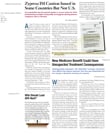APA's Office of Healthcare Systems and Financing (OHSF) has learned of a new reason for denying Medicare claims from Dr. Elliott Stein, an APA member in Miami Beach, Fla. The denials are the result of a program launched by the Centers for Medicare and Medicaid Services (CMS) in Florida to weed out beneficiary fraud and abuse.
According to James Corcoran, the medical director of Florida's Medicare carrier, First Coast Service Options, approximately 500 Medicare beneficiaries have been identified as having used far more medical services than program administrators found “medically believable.”
“In the past,” said Irvin “Sam” Muszynski, J.D., director of OHSF, “we have certainly been aware of CMS flagging physicians whom it believes are charging for more services than they could possibly deliver, but this is the first time we're aware of CMS's targeting beneficiaries.”
Although 500 people may seem like a small portion of Florida's Medicare population, Stein reported to APA staff that he had received overutilization denials for three patients. The claims were returned unpaid with a benefits code of “PR,” which stands for “patient responsibility,” and a numeric remark code of 151, which indicates“ payment adjusted because the payer deems the information submitted does not support this many services.”
When Stein first attempted to appeal the denials, he was turned down. In addition, he received a form letter instructing him to bill the patients for his services, although doing so would be contrary to his participating-provider agreement with Medicare.
Stein called First Coast's customer service line to find out why his appeal request was denied and was advised that his only option was to get each patient to sign a form authorizing him to appeal on the patient's behalf. This instruction was given despite the fact that Medicare participating providers may appeal denials without any special authorization.
The advice turned out to be incorrect. This is not surprising in light of a report published in July 2004 by the Government Accountability Office (GAO) stating that when the GAO posed questions to Medicare carrier call centers, only 4 percent of the responses were complete and accurate (PP&MC, September 17, 2004).
When OHSF staff contacted Lydia Rogers, the head of Program Integrity at First Coast Service Options in Florida, Rogers explained that the three claims denials Stein had received resulted from his patients' having been selected to undergo a benefit integrity audit after CMS had identified them as “very high” utilizers of services from a number of providers.
Rogers said that Stein could appeal the claims denials just as he would any other medical-necessity denials and would receive payment as soon as the carrier received proper documentation that the medically necessary care had been provided.
Rogers confirmed that CMS does identify beneficiaries believed to be overutilizers of services and automatically denies further claims on their behalf. She assured APA, however, that once the carrier obtained documentation proving that the billed care for these patients was needed and provided, the audit notation would be removed from their records.
Rogers said that these audits often uncover fraud arising from stolen identifcation or from beneficiaries' sharing identification with nonbeneficiaries to obtain care to which they are not entitled.
When a new Medicare patient comes to your office, it is wise to photocopy the patient's photo ID and keep it on file. If Medicare charges that one of your patients is committing fraud by allowing others to use his or her Medicare insurance, you can show that you made the effort to establish the patient's identity before you sent the patient's claim to Medicare and therefore had no involvement with any fraud that may have been committed.▪
